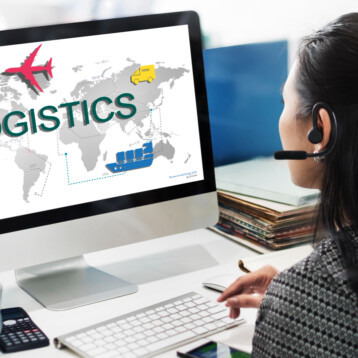The e-commerce industry got a serious boost with the emergence of COVID-19, and due to globalization processes. This has simultaneously increased the demand for delivery services all around the world, and, consequently, heavily impacted the amount of work the logistics companies are expected to perform. Such an unprecedented increase in market demands had in turn required new solutions to satisfy them, provided by transportation software development. Digitalization technologies keep integrating into the logistics industry more and more with each passing year to keep up with the times.
The report by the United Nations Conference on Trade and Development has stated that the e-commerce industry saw a whopping increase in sales share between 16 and 19 percent. Advanced logistic solutions play a major role in this growth because the e-commerce sector as a whole is heavily dependent on them throughout all of its activities.
To better understand the correlation, let’s get deeper into the topic of logistics and transportation software.

What is logistics software?
In its essence, logistics software is a variety of programs that were created to aid the management of production processes in the logistics industry. The exact applications are countless — logistics software can manage the arrangement for the delivery of materials to a production site, shipping the end product to distributors as well as almost any task in-between.
The main goals of using logistics software are to increase the efficiency of logistic cycles, therefore increasing the profits and strengthening the enterprise’s position in the market.
Which logistic solutions are the most popular in 2022 among the industry players? Let’s take a look.
Custom Supply Chain Management Software
Supply chain management software or SCMS is dedicated to analyzing all the parameters and features of a particular product in order to ensure its adequate handling by the supply chain participants. This process employs machine learning technologies trained to generate predictive models for increasing the operational efficiency of the company. Parameters that this software analyzes include:
- Pricing
- Tradability of the product
- Storage
- Factory adjustments
SCMS shows the best results when used in processes involving a lot of repetitious and labor-intensive tasks. SCMS allows these processes to be completed with improved efficiency and precision and also take much less time.

Big data is invaluable in logistics — it allows for enhancing the operational quality of the entire company through better decision-making and more efficient procedures.
For example, big data can help measure the efficiency of shippers’ performance in order to determine if their working sequence is optimal and make changes in case they’re needed. IoT-enabled sensors and gateways allow for precise data gathering and processing for subsequent analysis.
Some of the aspects that big data & IoT solutions can drastically improve:
- Speed of transportation
- Fuel consumption
- Routing
- Functionality planning and prediction
- Coordination with warehouse management systems
Transportation Management Software
A logistics company needs a reliable way of planning, preparing, and executing the transportation of products from point A to point B. This is where transportation management software or TMS comes into play.
TMS’s function is simple — to provide a transparent movement of goods and make sure that both inbound and outbound products are delivered in compliance with all the customer requirements as well as national and international laws.
Some benefits of using TMS include:
- Automation of slow processes
- Real-time notifications and better customer service
- Good scalability
- Accurate documentation
TMS is one of the best software for logistics types that affect almost all of the business processes taking place inside the logistics operations framework. The most important quality a good TMS solution could provide to an enterprise is visibility, which brings an invaluable increase in customer satisfaction and operational efficiency.
API-Powered Networks
While each individual software piece could be brilliant, the true key to maximizing efficiency lies in their ability to cooperate. This cooperation creates synergy and provides a smooth and uninterrupted business process. It can be achieved with API (application programming interface) integration of separate software components into a single network.
API logistics software system integration is no simple task, and it needs to be planned long in advance. The whole process of integration must be meticulously planned before getting to the next step in order to avoid a plethora of problems that arise from imperfect software coordination in the future.
The implementation of API-integrated software should always be gradual, with a constant process of learning for the staff members. It would be wise to avoid a situation where a company employs some complex and multi-faceted API-integrated software but the staff is unable to operate it effectively, and third-party experts need to be hired to compensate for that.
A good implementation plan will avert such problems and allow for the gradual and smooth implementation of API networks into your enterprise’s workflow.
We’ve reviewed the current most popular types of logistics software, but what is their exact influence on the industry?
How do these solutions transform the logistics?
- The global supply chain feels the impact of improved logistics solutions in faster and more efficient communication, enhanced levels of collaboration between different parties, and subsequent increase in delivery speed
- Operational costs are reduced for all participating companies, increasing their profits due to enhanced routing, storage logistics and management, and transportation procedures.
- A huge part of document handling throughout the supply chain processes becomes automated, greatly decreasing delays.
- Labor expenses are reduced as well due to heavy automation of the processes that were purely manual in the past
- Improved visibility of the supply chain allows for swift adjustments when they are needed, increasing the industry’s flexibility and reaction timings.
- Warehouse management is improved as well due to better space management and waste disposal.
Some final thoughts on the matter
There are many other logistics software trends besides the main ones we’ve described above, software for autonomous vehicle fleet management, for example. In today’s technological environment it looks like new solutions emerge faster than industry players can adopt them.
It is really hard to keep your enterprise up to date with the progress in all possible aspects, however, it is not even necessary to do so. What distinguishes the industry leaders from the rest of the market is the ability to see the most important factors among the sea of possibilities, and concentrate their efforts and resources on improvement there.
You don’t need perfection in every aspect of your business (and you’d most likely not be able to achieve it), you only need it where it matters the most, and success will follow in no time.










